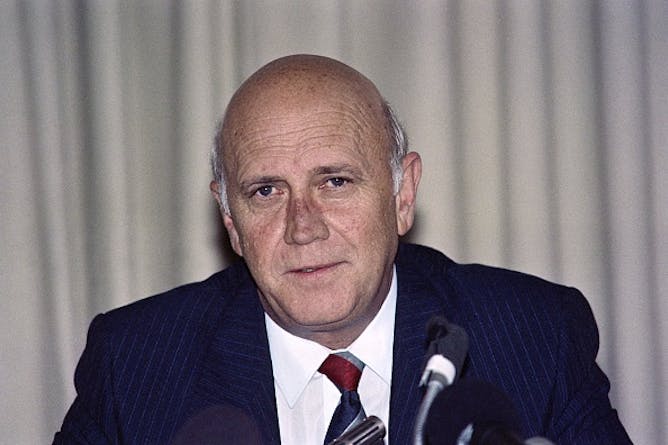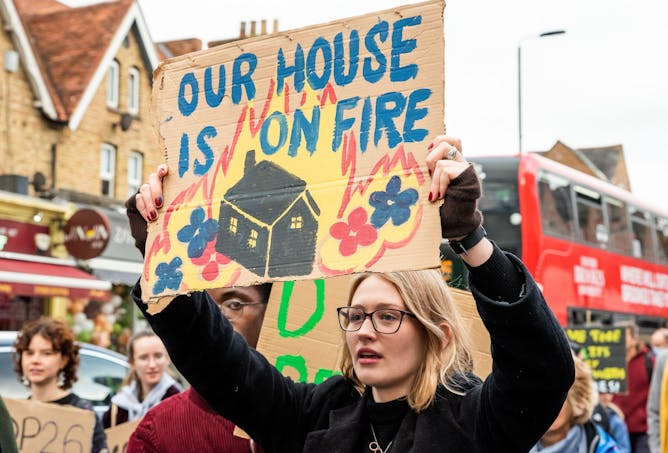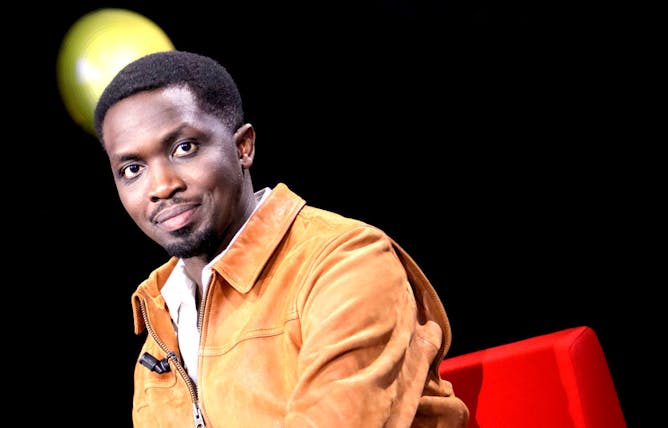|
I must have been about eight when an older boy up the road told me a low flying passenger plane was a Russian bomber. Terrified, I ran into our house for shelter. My neighbour stood smiling, clearly tickled by my apparent belief that a slate roof and parents could stand in the way of a megaton of Soviet Cold War atomic arsenal.
That’s what we worried about in the early 80s. For kids now, climate change is what keeps them awake at night. For some the stress is deep, and disturbing. Gemma Ware and Dan Merino find out just how tough the crisis is for many young people in the latest episode of The Conversation Weekly. We also have continuing coverage of COP26 from across our global network of academic experts as it enters its critical final stages. And Christi van der Westhuizen reflects on the life of FW de Klerk, the last president of apartheid South Africa, who died yesterday.
|

Former South African President FW de Klerk photographed in Pretoria in 1989.
EPA-EFE/Walter Dlhadlha (AFP/via Getty Images), via
Christi van der Westhuizen, Nelson Mandela University
FW de Klerk as National Party conservative was paradoxically the right leader at the right time to relinquish white minority rule.
|

Afraid, sad and anxious: what climate change is doing to young people.
Stephen Bell / Alamy Stock Photo
Gemma Ware, The Conversation; Daniel Merino, The Conversation
Experts explain the latest evidence on eco-anxiety in The Conversation Weekly.
|

Dirk Schmeller
Dirk Schmeller, Université de Toulouse III – Paul Sabatier
Mountain ecosystems are not as pristine as we may think – and climate change could trigger devastating transformations that will affect us all.
|
|
|
-
Edvin Aldrian, Badan Riset dan Inovasi Nasional (BRIN)
Multiple efforts to tackling the twin issues of sinking land surface and rising sea level are urgently needed.
-
Abdu Mohiddin, Aga Khan University ; Christopher Jack, University of Cape Town; Evans Kituyi, Aga Khan University Hospital; Kristie Ebi, University of Washington; Matthew Chersich, University of the Witwatersrand; Stanley Luchters, Aga Khan University Hospital
Many of the temperatures presently being recorded in Africa, and those projected in the next decade, are already close to the limits of human survival, or “liveability”.
-
Uma S Kambhampati, University of Reading; Subham Kailthya, University of Warwick
China has given itself a major advantage over India by constructing a massive road network in the past two decades.
-
Patrick Hesp, Flinders University
One of Europe’s last intact mobile and vegetated dune ecosystems is in danger of being loved to death. What can be done?
|
|

Mohamed Mbougar Sarr on a TV show after winning the Prix Goncourt.
Photo by Eric Fougere/Corbis via Getty Images
Caroline D. Laurent, American University of Paris (AUP)
He is the first writer from sub-Saharan Africa to lift the Prix Goncourt, one of the book world’s most important prizes. And his win matters.
|
|
|
-
Edward Wasserman, University of Iowa
The ‘Eureka!’ moment is a myth – an altogether naïve and fanciful account of innovation.
-
Ana Valdes, University of Nottingham
A high-risk version of a gene called LZTFL1 doubles the risk of respiratory failure and death from COVID.
-
David Markowitz, University of Oregon
Communication scholars have long wondered not just who lies the most, but also whether people tend to lie more online, in person or over the phone.
|
|